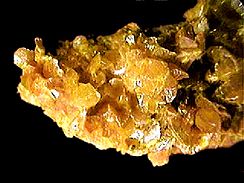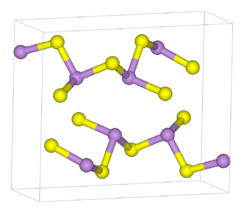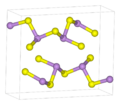Arsenic trisulfide facts for kids
Quick facts for kids Arsenic trisulfide |
|
|---|---|
 |
|
 |
|
|
Preferred IUPAC name
Arsenic trisulfide
|
|
| Other names | Arsenic(III) sulfide Orpiment |
| Identifiers | |
| CAS number | |
| PubChem | |
| EC number | 215-117-4 |
| RTECS number | CG2638000 |
| SMILES | S1[As]3S[As]2S[As](S[As]1S2)S3 |
|
InChI
InChI=1/As4S6/c5-1-6-3-8-2(5)9-4(7-1)10-3
|
|
| Properties | |
| Molecular formula | |
| Molar mass | 0 g mol-1 |
| Appearance | Orange crystals |
| Density | 3.43 g cm−3 |
| Melting point | |
| Boiling point | |
| -70.0·10−6 cm3/mol | |
| Hazards | |
| NFPA 704 |
|
| U.S. Permissible exposure limit (PEL) |
[1910.1018] TWA 0.010 mg/m3 |
| Related compounds | |
| Other anions | Arsenic trioxide Arsenic triselenide |
| Other cations | Phosphorus trisulfide Antimony trisulfide Bismuth sulfide |
| Except where noted otherwise, data are given for materials in their standard state (at 25 °C, 100 kPa) | |
Arsenic trisulfide, also called orpiment or arsenic(III) sulfide, is a special chemical compound. Its chemical formula is As2S3. This means it is made of arsenic and sulfur atoms. It is known for its bright yellow or orange color.
Contents
What is Arsenic Trisulfide?
Arsenic trisulfide is a solid substance. It can be found in two main forms. One form is like glass, which means it has no clear shape. The other form is crystalline, meaning it has a regular, repeating structure.
Physical Characteristics
This compound is usually a yellow solid. It can also appear as orange crystals. It is a semiconductor, which means it can conduct electricity under certain conditions.
Chemical Reactions and Safety
When arsenic trisulfide burns in air, it creates a very dangerous smoke. This smoke contains sulfur dioxide and arsenic trioxide. Arsenic trioxide is highly toxic. Over time, arsenic trisulfide can also form a toxic layer of arsenic trioxide on its surface. This compound does not react with acids. It is important to handle it with care due to its potential to form toxic substances.
Where is Arsenic Trisulfide Found?
Arsenic trisulfide naturally occurs as a mineral. This mineral is known as orpiment. Orpiment is often found in places where there has been volcanic activity or hot springs.
How is Arsenic Trisulfide Made?
Scientists can make arsenic trisulfide in a lab. One way is by mixing an arsenic compound, like arsenic trichloride, with hydrogen sulfide. Another method is to heat arsenic and sulfur together.
What is Arsenic Trisulfide Used For?
Arsenic trisulfide has had several uses throughout history and in modern times.
Historical Uses
Ancient Egyptians used arsenic trisulfide. They used it as a bright yellow pigment for art. It was also used in some ancient beauty products.
Modern Applications
Today, arsenic trisulfide is used in making certain types of glass. It is especially useful in making glass that can transmit infrared light. This type of glass is important for some scientific and technological devices.
See Also
Images for kids
 | Jessica Watkins |
 | Robert Henry Lawrence Jr. |
 | Mae Jemison |
 | Sian Proctor |
 | Guion Bluford |




